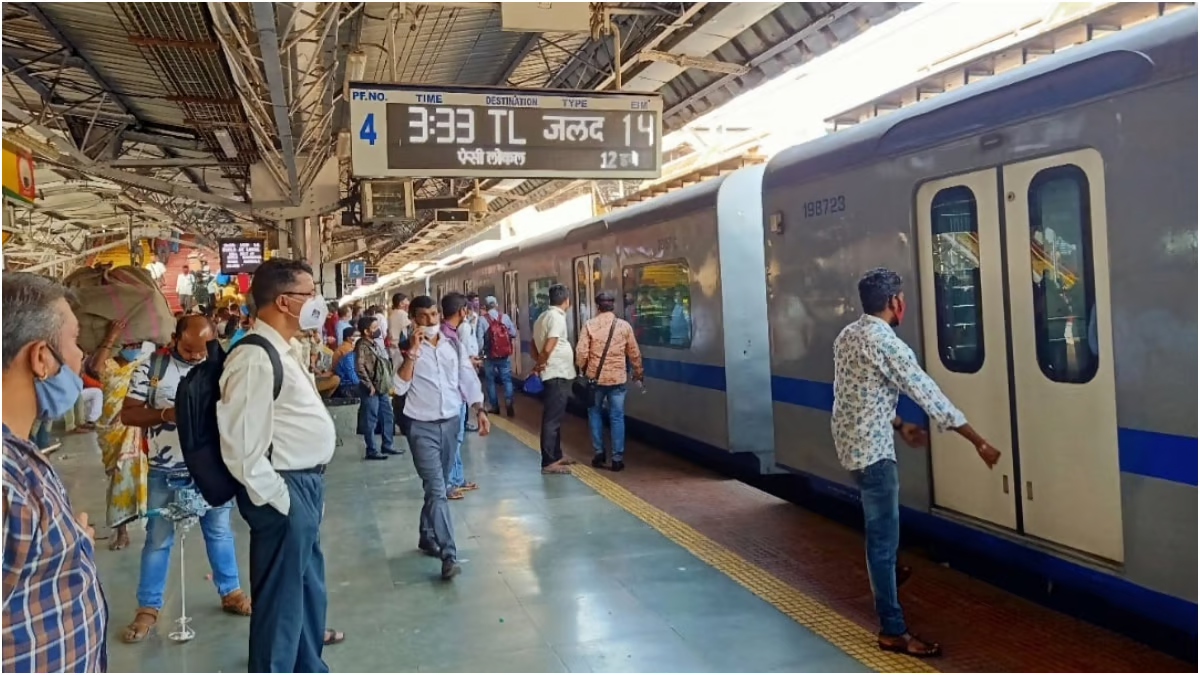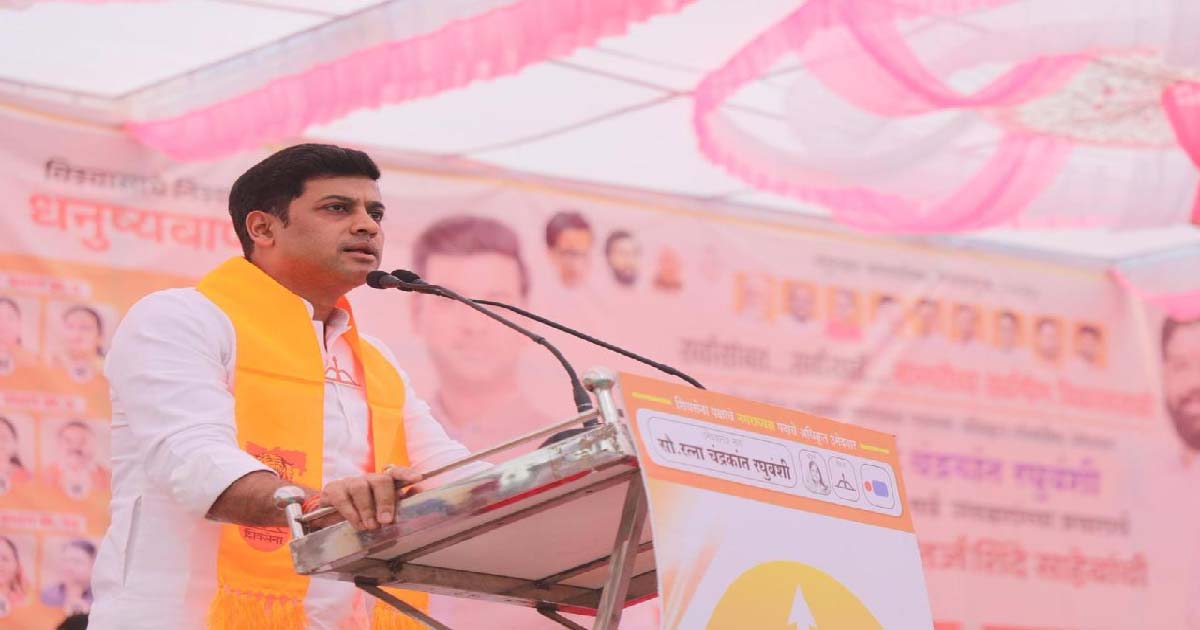Maharashtra
Central Railway’s Plan To End Harbour Line Services At Sandhurst Road & Cut Fast Train Halts At Byculla Faces Backlash

Central Railway’s (CR) recent proposal to terminate Harbour Line suburban services at Sandhurst Road and eliminate fast train halts at Byculla has sparked significant opposition from passengers’ associations and experts .
“The changes are being considered to facilitate the extension of the fifth and sixth lines up to Chhatrapati Shivaji Maharaj Terminus (CSMT)” said an official adding that this idea is still in its initial stage.
Former General Manager Of Central Railway On The New Plan
Criticizing the new idea of CR, Subodh Jain, former general manager of Central Railway and retired members of railway board said, ” I am unable to appreciate the proposal of terminating harbour line at Sandhurst Road. The traffic on the harbour line is growing at much faster rate because of growth in Navi Mumbai and connectivity to Western suburbs. Assuming that 40,000 commuters will reach Sandhurst Road and board during peak hour is foolish”
According to sources, the proposed alterations are intended to make space for the extension of the fifth and sixth lines up to CSMT. Currently, the fifth and the sixth lines exist between Kalyan and LTT and the work of extension of the 5th 6th line up to Patel is on.
“To accommodate this, CR is considering halting Harbour Line services at Sandhurst Road and repurposing platforms 1 and 2 at CSMT and Masjid for mainline slow services. This would also involve demolishing fast corridor platforms at Byculla to create room for new tracks, which would result in the removal of fast train stoppages between CSMT and Dadar” said a senior railway.
Strong Objections Raised
Passengers’ associations have also voiced strong objections to these proposals.
Subhash Gupta, Chairman of the Rail Yatri Parishad, also disapproved of the proposal, labelling it as “foolish” and calling for a reconsideration of alternative options.
Lata Agarde, Secretary of the Suburban Passengers Association, expressed strong concerns about the proposed termination of Harbour Line suburban services at Sandhurst Road. She highlighted that this move would significantly inconvenience commuters, particularly those travelling from Navi Mumbai. Agarde suggested that Central Railways reconsider relocating the Harbour Line services to the P D Mello Road side. Additionally, she criticized the plan to eliminate fast train stoppages at Byculla, arguing that it would worsen congestion at other stations. Agarde urged railway officials to re-visit Byculla station during peak hours to better understand the implications of their plan.
Siddhesh Desai a passenger activist, criticized the plan, suggesting that the termination of Harbour Line services at Sandhurst Road and the elimination of stoppage of fast train services at Byculla would disrupt commuter convenience. He urged the Railway authorities to explore alternative solutions.
The fifth and sixth lines currently exist between Kalyan to LTT. The extension of the 5th and 6th lineup to Parel is on. The debate over their alignment between Parel and CSMT has been complicated by land acquisition issues, particularly the need for private land.
Previously, CR proposed an alternative alignment for the Harbour Line, which involved rerouting over the Eastern Freeway and terminating Harbour Line services at a deck on existing platforms 17 and 18 at CSMT. However, this plan was eventually scrapped.
Maharashtra
Mumbai Weather Update: City Continues To See Smog-Filled Morning Amid Rising Pollution; Overall AQI Remains In Unhealthy Range At 281

WETHER
Mumbai: Mumbai began its Friday with a deceptively pleasant chill, as minimum temperatures dipped just below 22°C, offering residents a brief sense of relief. However, this early coolness quickly gave way to discomfort as people stepped outside to find the city blanketed in a dense, lingering smog. Commuters heading out during peak morning hours encountered reduced visibility along with eye irritation, throat discomfort and difficulty breathing, clear signs of an atmosphere overloaded with pollutants.
What initially felt like a refreshing morning soon became yet another stark indicator of Mumbai’s steadily worsening air-quality crisis. A thick haze settled over major roads, residential complexes, commercial hubs and transit routes. With only weak winds sweeping across the region, there was little natural movement to disperse the pollutants that have been steadily accumulating throughout November.
The India Meteorological Department (IMD) reported that the city is expected to experience clear skies through the day, with temperatures likely climbing to around 33°C in the afternoon. While the mild morning chill is expected to persist over the next few days, experts noted that there is still no sign of when Mumbai’s air quality might improve. The stagnant atmospheric conditions continue to trap particulate matter close to the surface, aggravating the city’s pollution load.
On Friday, Mumbai’s overall Air Quality Index (AQI) rose to a worrying 281, placing it firmly in the unhealthy category. This spike represents a major deterioration from earlier in the month, when several neighbourhoods reported moderate or merely poor readings. The decline is now citywide, affecting coastal stretches, industrial belts and densely populated residential areas alike.
Among the worst-affected locations, the Wadala Truck Terminal recorded an alarming AQI of 395, marking it as the most polluted spot of the day. Colaba followed with a reading of 317, while Chakala reported 310, both falling within the severe category.
Prominent business zones were not spared either: Worli and the Bandra-Kurla Complex (BKC) each logged AQI levels of 310, showing how uniformly pollution has spread across Mumbai’s central, western and eastern sectors.
Some suburbs fared marginally better but still failed to reach healthy levels. Kandivali East recorded the day’s lowest AQI at 130, classified as poor. Powai stood at 200, Malad West at 210, Parel Bhoiwada at 220, and Mulund West at 237, placing all within the poor to unhealthy range.
For context, an AQI of 0–50 is considered good, 51–100 moderate, 101–150 poor, 151–200 unhealthy, and anything above 200 classified as severe or hazardous. With much of the city now above that threshold, Mumbai continues to grapple with an air-quality crisis that shows no signs of easing.
Maharashtra
Mumbai: Massive Fire Breaks Out Inside Godown In Kurla’s Kismat Nagar;

Mumbai: A major fire erupted inside a godown in Kurla West’s Kismat Nagar area on Thursday night, triggering a swift response from the Mumbai Fire Department. Videos circulating on social media showed towering flames accompanied by dense black smoke rising high above the godown, visible from several hundred metres away.
According to officials, the Brihanmumbai Municipal Corporation (BMC) Fire Brigade received an emergency call at 11:08 pm, following which multiple fire tenders were rushed to the spot. Initial assessments categorised the blaze as a Level-II fire, but as flames rapidly spread across adjoining structures, the situation escalated. By 11:44 pm, the Mumbai Fire Brigade declared it a Level-III (major) fire after the inferno engulfed nearly 10 to 12 chawl structures.
Firefighters battled the spreading flames through the night, working to prevent the blaze from reaching densely packed residential units in the vicinity. The godown where the fire originated was located within a chawl cluster, making containment especially challenging. Thick plumes of smoke blanketed surrounding localities as emergency teams attempted to bring the situation under control.
Several agencies were deployed as part of the coordinated response effort, including the BMC Fire Brigade, local police, ward officials, the Electricity Distribution Company and a 108 ambulance unit. Despite the scale of the fire and the proximity to residential structures, authorities reported no injuries so far. The cause of the blaze remains under investigation.
Meanwhile, in a separate incident late Wednesday night, a car fire on the Bandra Worli Sea Link caused major disruption to traffic. The vehicle, identified as a Honda sedan, reportedly rammed into the side barrier at high speed before catching fire. Motorists on the busy sea link were left stranded as a long traffic snarl developed, with many unsure of the cause until videos began circulating online.
Footage showed the vehicle completely charred, with firefighters working quickly to extinguish the flames. Though the fire generated thick smoke and intense heat, no casualties have been confirmed. Fire officials later stated that the blaze was brought under control after brief yet intense firefighting efforts.
Maharashtra
Shiv Sena wave in North Maharashtra, Dr. Shrikant Shinde takes charge of election campaign

Mumbai Nandurbar: Shiv Sena is on a wave in North Maharashtra. A large number of “Ladli Bheenas” and youth are participating in the rallies of Shiv Sena youth leader Dr. Shrikant Shinde. Dr. Shinde launched his election campaign in North Maharashtra today. Addressing the gathering, he said that the Mahayoti government has taken strong steps to empower women and youth, which is why Maharashtra’s Ladli Behna Yojana is becoming self-reliant. Attacking the opposition, he said that many opposition leaders were opposing the “Ladli Behna Yojana” but under the leadership of Deputy Chief Minister Eknath Shinde, this scheme was implemented and it will not be stopped under any circumstances. The opposition is only spreading confusion, Ladli Behna will respond with their votes. Dr. Shrikant Shinde explained that in the last three years, Shiv Sena has reached every corner of Maharashtra under the leadership of Eknath Shinde. Shinde Sahib is empowering his workers by holding eight meetings every day. He has an Urban Development Department, which has resulted in record-breaking funding for the backward villages of Maharashtra, paving the way for strong rural development.
Dr. Shrikant Shinde criticized UBT and said that some people are experts in criticizing, but they have never done any concrete work for the people. That is why today Mahayoti candidates are seen everywhere. The people are well aware of the state of the opposition.
-

 Crime3 years ago
Crime3 years agoClass 10 student jumps to death in Jaipur
-

 Maharashtra1 year ago
Maharashtra1 year agoMumbai Local Train Update: Central Railway’s New Timetable Comes Into Effect; Check Full List Of Revised Timings & Stations
-

 Maharashtra1 year ago
Maharashtra1 year agoMumbai To Go Toll-Free Tonight! Maharashtra Govt Announces Complete Toll Waiver For Light Motor Vehicles At All 5 Entry Points Of City
-

 Maharashtra1 year ago
Maharashtra1 year agoFalse photo of Imtiaz Jaleel’s rally, exposing the fooling conspiracy
-

 National News1 year ago
National News1 year agoMinistry of Railways rolls out Special Drive 4.0 with focus on digitisation, cleanliness, inclusiveness and grievance redressal
-

 Maharashtra1 year ago
Maharashtra1 year agoMaharashtra Elections 2024: Mumbai Metro & BEST Services Extended Till Midnight On Voting Day
-

 National News1 year ago
National News1 year agoJ&K: 4 Jawans Killed, 28 Injured After Bus Carrying BSF Personnel For Poll Duty Falls Into Gorge In Budgam; Terrifying Visuals Surface
-

 Crime1 year ago
Crime1 year agoBaba Siddique Murder: Mumbai Police Unable To Get Lawrence Bishnoi Custody Due To Home Ministry Order, Says Report












